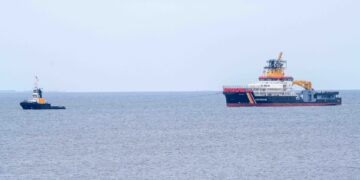The topic of material maintenance has caused much dissatisfaction in recent years: in the Federal Ministry of Defence, in the Federal Office of Bundeswehr Equipment, Information Technology and In-Service Support (BAAINBw), in industry, in politics and among soldiers. The players are quite irreconcilable in their respective perspectives and the debates about planning, operational readiness, adherence to deadlines and budgets, bureaucracy and procurement law are never-ending. However, there is a common interest: a well-equipped navy with many units at sea! It is therefore important that the key aspects underlying this problem are now comprehensively rethought: the actual maintenance, including the awarding of contracts, as well as numerous sub-issues ranging from personnel recruitment to the stocking of spare parts. The goal is predictability and high quality, because that creates motivation and success!

MdB Siemtje Möller in conversation with Flotilla Admiral Ralf Kuchler, Commander of Flotilla 2 (right) and Frigate Captain Stefan Klatt, Commander of EGV "Berlin"
Here I would like to briefly discuss some aspects that need to be changed. Not comprehensively, but as an impetus for further discussion. In view of the large number of units to be repaired, a large number of skilled workers are needed to be able to realise the upcoming projects in a reasonable amount of time. In recent decades, however, maintenance staff have often been cut back. There is an urgent need to recruit more staff. In my view, however, the maintenance sector in particular needs a way of accessing qualified personnel quickly without lengthy, centrally controlled processes. An example: An industrial mechanic loses his job on the coast. His qualifications would be in high demand in the naval maintenance sector and he could fill a position that has been vacant for a long time at the naval arsenal or in a defence technology department. Unfortunately, there is currently no possibility of hiring him directly via an unsolicited application; instead, recruitment and staffing continue to be handled centrally by the Federal Office of Bundeswehr Personnel Management (BAPersBw). The recruitment processes are generally too lengthy and interested candidates often wait months for a response. This does not create motivation, but motivation is one of our most important assets when it comes to material operations and maintenance.
Large parts of the fleet will soon have to go to the shipyard or are already there. Some repair contracts are so complicated that complaints and lawsuits from companies unnecessarily prolong the actual process. New tenders now also include nine to twelve months for complaints and proceedings. This time is then lacking when it comes to eliminating obsolescence and there is a risk of ending up without a new helicopter, the right ammunition or the entire frigate. We cannot afford this in view of our global integration, our obligations to secure various sea routes and the smallest German navy ever operated. The awarding of new contracts must be revised in such a way that complaints and grievances about the process decrease and do not continue to drag it out. Multi-partner framework agreements, sensibly and transparently designed, can streamline the process and create planning security for the navy and industry.
The German shipyard landscape is fragmented, with differently oriented, specialised and structured locations. This is one of the great strengths of this industry: it can look back on many years of experience. However, all shipyards need a clear picture of the damage and faster integration of supplements into the main order in order to be able to complete the repair work more quickly. In my view, it is therefore essential to set up project coordination close to the coast. These management functions must be designed in such a way that they can not only make and monitor organisational and structural decisions, but can also make financial decisions up to a capped amount. A team on site can make decisions at short notice, which can significantly reduce downtime. A so-called Systemhaus See, which bundles maritime expertise in shipbuilding and maintenance, can be established at the end of such a design process. While more than twenty units will have to be procured over the next ten years for new builds, the existing units will become older and therefore more susceptible to repairs. There are therefore a considerable number of maritime projects that need to be realised and can secure work at the German shipyard locations. In order to initiate this huge reform process, many interfaces need to be taken into account. This is why a comprehensive and open dialogue is still necessary. At the end of October, a first round table on the topic took place at the invitation of politicians. Over the next year, the ideas that have been brought together will be explored in greater depth and elaborated on in order to finally organise naval deployment efficiently. We owe it to our servicemen and women and our partners around the world: they should be able to rely on us!
Siemtje Möller (SPD) is a member of the German Bundestag and a member of the Defence Committee.
Photos: German Bundestag/Köhler; PIZ Marine












0 Kommentare